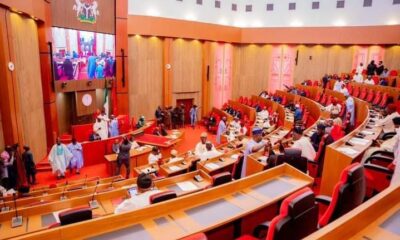NEWS
Kano Assembly Rejects Tax Reform Bill, Calls It Economic Sabotage
The Kano State House of Assembly has formally rejected the federal tax reform bills currently under consideration in the National Assembly, warning that the proposed changes would exacerbate economic disparities and increase hardship in the northern region.
The decision came during a plenary session on Monday, presided over by Speaker Rt. Hon. Ismail Jibrin Falgore.
Majority Leader Lawan Husseini, who represents Dala Constituency, moved the motion, urging northern lawmakers and the conference of speakers to ensure the bill does not pass.
READ MORE: EFCC Makes Single Largest Asset Recovery Till Date
Husseini described the bill as a “calculated plan to sabotage the economy,” expressing concerns about the proposed allocation of Value Added Tax (VAT).
He argued that wealthier states, such as Lagos, would receive the largest share due to their concentration of major companies, leaving many northern states struggling to fund essential services.
“This bill will further weaken northern states, some of which are already unable to pay salaries,” Husseini warned. “It will only increase poverty and hardship in the region.”
Salisu Mohammed, representing Doguwa Constituency, supported the motion and criticized the federal government for prioritizing the tax reform bill over more pressing national issues.
“The Senate should focus on challenges like insecurity and unemployment instead of rushing to pass this bill,” Mohammed said.
Another lawmaker, Murtala Kadage of Garko Constituency, called for unity among northern representatives to ensure the bill is defeated.
After deliberations, the House resolved to urge northern members of the Senate, House of Representatives, and the conference of speakers to take immediate action to block the bill’s passage.
International News
Mexico To Raise Minimum Wage By 12% In 2025
In a bid to support low-income workers, Mexico has announced plans to raise its minimum wage by 12% starting January 2025.
The announcement was made Wednesday by Labor Minister Marath Bolaños during President Claudia Sheinbaum’s daily press conference, underscoring the government’s commitment to a “humanist economy” focused on reducing inequality.
The increase will see the daily minimum wage rise from 249 pesos ($12.23) to 278.80 pesos nationwide, while workers in northern border regions will earn approximately 420 pesos per day due to higher regional costs.
This adjustment reflects an agreement between labor and business sectors and builds on significant wage hikes in recent years.
“We continue on the path to rebuild the minimum wage and the purchasing power of Mexican men and women,” Bolaños said, highlighting that the wage has more than doubled—up 135%—since 2018 under successive leftist governments.
President Sheinbaum, who assumed office in October, has committed to maintaining annual wage increases of around 12% throughout her term.
Responding to concerns that the hike could stoke inflation, she dismissed such fears as unfounded.
“They said this would increase inflation. That’s false,” Sheinbaum said, pointing to central bank data indicating the hike will not have significant inflationary effects.
The administration’s long-term goal is to ensure the minimum wage covers 2.5 “basic food baskets,” a measure of essential groceries for a family of 3.7 people, by the end of Sheinbaum’s term.
NEWS
Reps Demand N100m Boost For Tobacco Control Fund
The House of Representatives has called on the Federal Government to allocate ₦100 million to Nigeria’s Tobacco Control Fund, enhancing its capacity to enforce the National Tobacco Control Act.
During Wednesday’s plenary, Bassey Akiba, representing Calabar Municipal/Odukpani Federal Constituency, emphasised the need for increased funding.
He highlighted that the current allocation of ₦10 million in the 2024 budget falls short of what is required to combat tobacco-related health issues effectively.
READ MORE: Martial Law: South Korea Opposition Files Impeachment Motion Against President Yoon
“Tobacco control is crucial due to its impact on preventable deaths, including cancer,” Akiba stated. He warned that inadequate funding could worsen health risks, noting tobacco consumption’s link to cardiovascular diseases, stroke, and cancer.
The House urged the Federal Ministry of Health to provide a detailed report on the Tobacco Control Fund, including its balance, funding sources, and previous expenditures.
Speaker Tajudeen Abbas backed the motion, stressing the importance of sustainable funding to reduce dependence on international donors.
The House resolved to advocate for a ₦100 million allocation in the 2025 budget to bolster the fund’s effectiveness.
NEWS
Experts Urge Action To Boost Family Planning For FP2030 Targets
At the eighth Nigeria Family Planning Conference held in Abuja, medical experts stressed the urgent need to address high fertility rates and low family planning uptake to improve maternal and child health outcomes.
The event, themed “Sustaining Commitments for Family Planning within the Nigeria Health Sector Renewal Investment Initiative,” was organised by the Association for the Advancement of Family Planning (AAFP) in collaboration with the Federal Ministry of Health and Social Welfare.
Dr Ejike Oji, Chairman of the AAFP Management Committee, underscored the transformative potential of family planning as a tool for sustainable development. He highlighted its multifaceted benefits, including saving lives, promoting gender equity, and fostering economic growth. According to Oji, “$1 invested in contraceptive services saves $3 in maternal and newborn health costs by reducing unintended pregnancies.”
READ MORE: Martial Law: South Korea Opposition Files Impeachment Motion Against President Yoon
Despite some progress, Nigeria’s Contraceptive Prevalence Rate (CPR) remains at 15 per cent, with an unmet need of 21 per cent. Dr Oji called for increased collaboration and innovation to meet the FP2030 targets.
Funmilola OlaOlorun, Co-Principal Investigator at Performance Monitoring for Action/Nigeria, emphasised the need for strict adherence to the national family planning blueprint to achieve a two per cent annual CPR increase. “We cannot do business as usual,” she stated, urging for more funding, dedication, and resource mobilisation.
Samuel Oyeniyi, Director at the Reproductive Health Department, acknowledged the slow but steady progress towards FP2030. He emphasised the importance of integrating family planning into broader health initiatives to bridge existing gaps.
The conference highlighted Nigeria’s renewed commitment, including a $4 million government investment in family planning and the integration of family planning services into the healthcare provision fund, ensuring access for marginalised groups.
















jokerbet
December 2, 2024 at 11:39 pm
Your writing is like a breath of fresh air in the often stale world of online content. Your unique perspective and engaging style set you apart from the crowd. Thank you for sharing your talents with us.